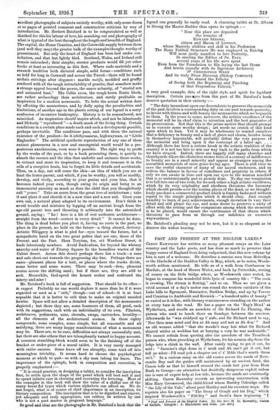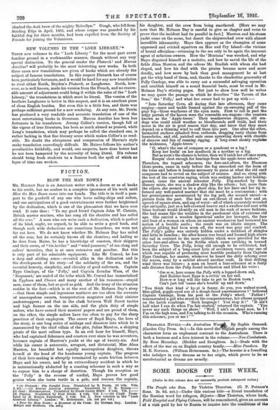PAST AND PRESENT AT THE ENGLISH LAKES.* CANON RAWNSLEY has
written so many pleasant essays on the Lake country and the Lake poets, and has done so much to preserve that happy corner of England from being vulgarized, that this new volume by him is sure of a welcome. He describes a sunrise seen from Helvellyn or the bluebells of the Duddon Valley in May, which, as ho notes, Words- worth seldom mentioned. He tells us of a walk from Gowbarrow to Mardale, at the head of Hawes Water, and back by Patterdale, resting of course on the little bridge where, as Wordsworth once rested, ho began to compose his wonderful little lyric of country life : " The cock is crowing, The stream is flowing," and so on. Then we are given a vivid account of a day's motor run round the western outskirts of the Lake hills to Egremont, Muncaster, Duddon Bridge, and up by Torver and Coniston to Ambleside and Keswick—" a hundred miles of beauty " as varied as it is fine, with literary reminiscences crowding on the author at every turn in the road. He has a paper on the ` Nag's Head' at Wytheburn, and recalls an anecdote of Sir Richard Le Fleming, the parson who used to lunch there on Sundays between tho services. Afterwards he "was stiddyed up t' aisle, and Sir Richard used to say,
Noo thoo mun mind and den as Ah saay and nut as Ah den.' " And an old woman added " that she waadn't saay but what Sir Richard slanted whiles at wedding but at burying a corp he was undeniable." We cannot refrain from quoting also the anecdote of the Troutbeck parson who, when preaching at Wytheburn, let his sermon slip from tho ledge into a chink in the wall. After vainly trying to get it out, ho said : " Sarmint's slipt doun in t' neuk and Ah can't git it oot, but tell ye what—rll read yeh a chapter cot o' t' Bible that's wurth three on't." In a curious essay on the old routes across the sands of More- cambe Bay and the guides still maintained by an ancient fund, the Canon tells us that ho himself crossed the sands last year from Hest Bank to Grange—an attractive but decidedly dangerous exploit unless One is sure of expert help at low tide, because the sands are continually shifting. Canon Rawnaley records an interesting conversation with Miss Mary Greenwood, the child-friend whom Hartley Coleridge called " the Lily of the Vale," about poor Hartley and his eccentric ways. He reprints also his paper on " The Story of Gough and his Dog," which inspired Wordsworth's " Fidelity " and Scott's lines beginning " I • Pad and Present at the English Lakes. By the Hes% H. D. Hawheley, Vance of Carlisle. Glasgow : J. 3IscLehose and Sons. pa. set.1
climbed the dark brow of the mighty Helvellyn." Gough, who fell from Striding Edge in April, 1805, and whose corpse was guarded by his faithful dog for three months, had been expelled from the Society of Friends for joining the Volunteers.































 Previous page
Previous page